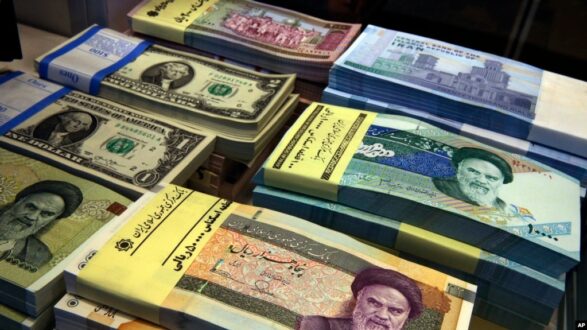RFL/RE – Iran’s national currency, the rial, fell to a record low against the U.S. dollar as unrest triggered by the death in custody of a young woman over an alleged head scarf violation continues to rock the country.
The rial traded at 396,700 to the dollar on December 20, according to traders in Tehran and the Bonbast.com foreign-exchange website, down from the quoted price of 353,400 a month ago.
Before the beginning of the recent protests, which came after the death of 22-year-old Mahsa Amini on September 16, the rial was at 298,200 to the dollar.
The weakening of the currency has also intensified due to reports about the end of hopes for a revival of a 2015 nuclear accord between Tehran and global powers.
Iran’s foreign minister and top nuclear negotiator met with the European Union’s foreign policy chief and the bloc’s official who is coordinating nuclear talks with Iran in Jordan on December 20, according to the official Iranian news agency IRNA. No further details of the meeting were released.
A video has gone viral on Iranian social networks in which U.S. President Joe Biden tells an Iranian protester on the sidelines of an election rally in California on November 4 that the Joint Comprehensive Plan of Action (JCPOA) agreement “is dead, but we are not going to announce it.”
بایدن: برجام مُرده.در ویدئویی که به دستم رسیده، بایدن صریحاً میگوید به #برجام بازنمیگردد، ولی دولت آمریکا فعلاً اعلام نخواهد کرد.این ویدئو که برای اولین بار منتشر میشود، حاشیهی رویداد انتخاباتی ۴ نوامبر در کالیفرنیا را نشان میدهد.با زیرنویس فارسی و انگلیسی#انقلاب۱۴۰۱ pic.twitter.com/OerHZav9Kb— دامون مقصودی (@DamonMaghsoudi) December 20, 2022
When the nuclear deal was signed with world powers, the rial was trading at 32,000 to the dollar. The agreement gave Tehran relief from financial sanctions in return for curbs on its nuclear program.
The accord collapsed in 2018 when then-U.S. President Donald Trump pulled out of the deal and reimposed crippling sanctions that have battered Iran’s economy and its currency. After Washington withdrew, Iran began to breach some of the pact’s nuclear limits saying they could no longer be enforced.
Tehran insists its nuclear program has only civilian purposes, but the West fears it could be moving closer to being able to construct nuclear weapons.
 Shabtabnews In this dark night, I have lost my way – Arise from a corner, oh you the star of guidance.
Shabtabnews In this dark night, I have lost my way – Arise from a corner, oh you the star of guidance.



